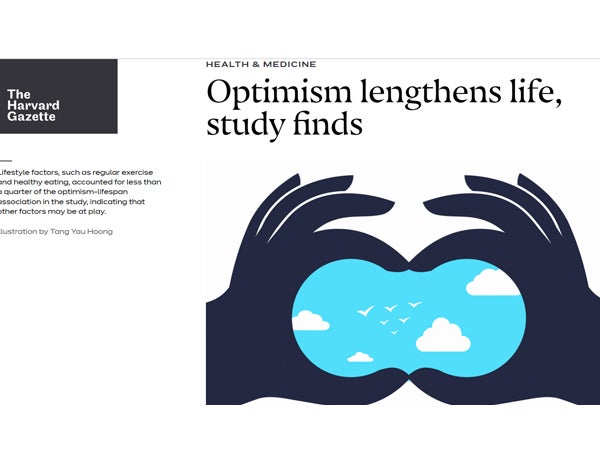A study led by our graduate student affiliate Hayami Koga (faculty member Laura Kubzansky is also an author) received the highest Altmetric score (1717) for being the most cited, shared, and “talked about” article in the Journal of the American Geriatrics Society in 2022. The study, which was profiled in The Harvard Gazette, found that women across racial and ethnic groups who reported having a positive outlook, were more likely…
Study led by graduate student affiliate Hayami Koga focus of Harvard Gazette piece on optimism and longevity
Our graduate student affiliate, Hayami Koga, is lead author of a study published in the Journal of the American Geriatrics Society (faculty member Laura Kubzansky is also an author) that builds upon prior research on women and longevity by expanding across diverse racial and ethnic groups.
Optimistic outlook linked to greater, even “exceptional,” longevity
Laura Kubzansky and her colleagues have published a paper in PNAS that has furthered previous research on the link between optimism and better health to now find a relationship between optimism and greater longevity (up to 15% longer, on average) including increased odds of living to 85 years old or beyond. The findings have received much attention in the press… Harvard T.H. Chan School of Public Health Psychology Today CNBC…
Continue reading “Optimistic outlook linked to greater, even “exceptional,” longevity”
Aging Well; Examining Health of Those on Their Way to Becoming Centenarians
Former Harvard Pop Center Bell Fellow Hiram Beltran-Sanchez, PhD, has co-authored a study that examines the long-term trajectories of disease, disability and cognitive functioning among potential centenarians, finding that those who lived to 100 had experienced overall better health along their journey to the century mark than the non-surviving members of their cohort, with about 25% with no chronic illness, 20% with no disability, and over 50% with no cognitive…
Continue reading “Aging Well; Examining Health of Those on Their Way to Becoming Centenarians”


